七年级下册unit5语法知识点
Unit5知识归纳人教版七年级英语下册
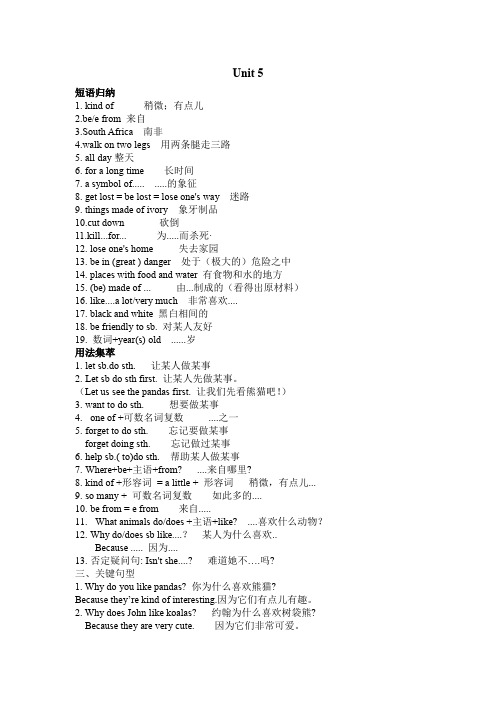
Unit 5短语归纳1. kind of 稍微;有点儿2.be/e from 来自3.South Africa 南非4.walk on two legs 用两条腿走三路5. all day整天6. for a long time 长时间7. a symbol of..... .....的象征8. get lost = be lost = lose one's way 迷路9. things made of ivory 象牙制品10.cut down 砍倒11.kill...for... 为.....而杀死·12. lose one's home 失去家园13. be in (great ) danger 处于(极大的)危险之中14. places with food and water 有食物和水的地方15. (be) made of ... 由...制成的(看得出原材料)16. like....a lot/very much 非常喜欢....17. black and white 黑白相间的18. be friendly to sb. 对某人友好19. 数词+year(s) old ......岁用法集萃1.let sb.do sth. 让某人做某事2.Let sb do sth first. 让某人先做某事。
(Let us see the pandas first. 让我们先看熊猫吧!)3.want to do sth. 想要做某事4.one of +可数名词复数....之一5.forget to do sth. 忘记要做某事forget doing sth. 忘记做过某事6.help sb.( to)do sth. 帮助某人做某事7.Where+be+主语+from? ....来自哪里?8.kind of +形容词= a little + 形容词稍微,有点儿...9.so many + 可数名词复数如此多的....10.be from = e from 来自.....11.What animals do/does +主语+like? ....喜欢什么动物?12.Why do/does sb like....?某人为什么喜欢..Because ..... 因为....13.否定疑问句: Isn't she....? 难道她不….吗?三、关键句型1. Why do you like pandas? 你为什么喜欢熊猫?Because they’re kind of interesting.因为它们有点儿有趣。
仁爱七年级下册 unit 5 必考知识点
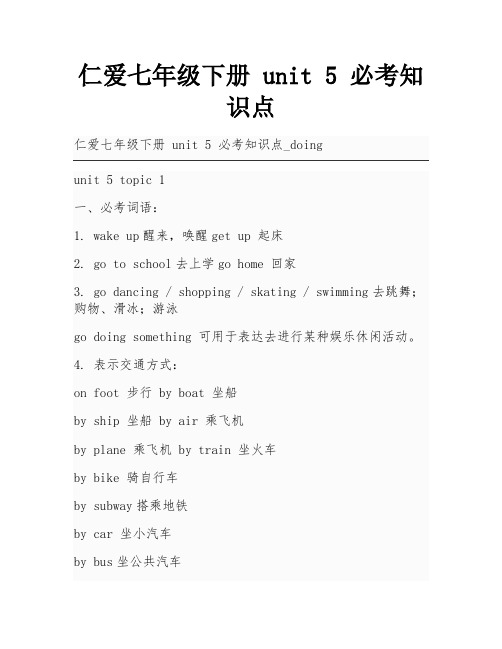
仁爱七年级下册 unit 5 必考知识点unit 5 topic 1一、必考词语:1. wake up醒来,唤醒get up 起床2. go to school去上学go home 回家3. go dancing / shopping / skating / swimming去跳舞;购物、滑冰;游泳go doing something 可用于表达去进行某种娱乐休闲活动。
4. 表示交通方式:on foot 步行 by boat 坐船by ship 坐船 by air 乘飞机by plane 乘飞机 by train 坐火车by bike 骑自行车by subway搭乘地铁by car 坐小汽车by bus坐公共汽车5. take the subway / bus / car搭乘地铁;公共汽车;小汽车6. drive a car to work = go to work by car驾车去上班take a bus to work = go to work by bus 乘公共汽车去上班go to school on foot = walk to school步行去上学7. ride a bike / horse骑自行车;骑马8. after school / class放学以后;下课以后9. play the piano / guitar/ violin弹钢琴;吉他;小提琴play basketball / soccer / football 打篮球;踢足球;打橄榄球play puter games玩电脑游戏play with a puter 玩电脑 play sports 做运动10. next to紧挨着,在…旁边11. on weekdays在工作日 at weekends在周末12. have breakfast / lunch / supper / dinner / meals 吃早餐;中餐;晚餐;正餐;一日三餐have classes / lessons / a meeting上课;上课;开会13. watch tv / movies / games / the animals看电视;电影;比赛;动物read novels / newspapers / books看小说;报纸;书14. wash one’s face / clothes洗脸;衣服15. 反义词:up – down, early – late近义词:quickly– fastget up early 早起 be late for 迟到16 表示建筑物(尤其学校建筑物):on the playground在操场 at school / home / table学校;家里;桌旁in a puter room / teachers’ office / classroombuilding / gym / library / lab / canteen在电脑室;教师办公室;教学楼;体操馆;图书馆;实验室;食堂17. around six o’clock = at about six o’clock大约在六点18. 频率副词:never, seldom, sometimes, often, usually, always重点详解1.i always e to school by bus.by+交通工具名称,表示使用某种交通方式,中间不加限定词,如果交通工具前有a, the, my 等限定词,就不能用by,而是用in或是on.on the train=by train on his bike=by bike in my car=by car.巧辩异同on foot 与 walkon foot “走路”,是介词短语,不能作谓语,只作方式状语,位于句末。
(完整版)人教版七年级英语下册第五单元知识点总结

人教版七年级下册英语第五单元Unit5 Why do you like pandas? 知识要点重要短语like…a lot 非常喜欢… black and white 黑白相间 all day整天Let’s do= let us do 让我们做……kind of 有点儿,稍微 South Africa南非be from/come from 来自于save the elephants救助大象one of…其中之一a symbol of good luck好运的象征 get lost迷路 cut down 砍倒for a long time 很长时间in great danger处于(极大)危险之中things be made of ivory由象牙制成的东西 places with food and water有食物和水的地方kill……for……为……杀1.see the pandas 看熊猫2.my favorite animals我最喜欢的动物3.welcome to sp 欢迎来某地4.welcome back to sp 欢迎回到某地5.be from 来自e from来自7.in the zoo 在动物园里8.on the farm 在农场里9.my new pet 我的新宠物10.walk on two legs 用两条腿走11.kind of有点12.kind of interesting有点有趣13.a little有点14.a little boring有点无聊15.a kind of一种16.all kinds of 各种各样的17.all day整天18.a good name for sb对某人是一个好名字19.South Africa南非20.South China华南21.South America南美洲22.America, the USA美国23.the UK ,England英国24.the South Pole南极25.what animals什么动物26.save the elephants挽救大象27.one of +n复数。
七年级英语下册Unit5知识点汇总

七年级英语下册Unit5知识点汇总Unit5ourSchoolLifeTopic1一、重点词语:aeup醒来,唤醒getup起床gotoschool去上学gohoe回家godancing/shopping/sating/siing去跳舞;购物、滑冰;游泳godoingsoething可用于表达去进行某种娱乐休闲活动。
表示交通方式:onfoot步行byboat坐船byship坐船byair乘飞机byplane乘飞机bytrain坐火车bysubay搭乘地铁bycar坐小汽车bybus坐公共汽车bybie骑自行车taethesubay/bus/car搭乘地铁;公共汽车;小汽车driveacartoor=gotoorbycar驾车去上班taeabustoor=gotoorbybus乘公共汽车去上班gotoschoolonfoot=altoschool步行去上学rideabie/horse骑自行车;骑马afterschool/class放学以后;下课以后playthepiano/guitar/violin弹钢琴;吉他;小提琴playbasetball/soccer/football打篮球;踢足球;打橄榄球playputergaes玩电脑游戏playithaputer玩电脑playsports做运动0.nextto紧挨着,在…旁边1.aplanofyschool一幅我们学校的平面图oneedays在工作日ateeends在周末3.havebreafast/lunch/supper/dinner/eals吃早餐;中餐;晚餐;正餐;一日三餐haveclasses/lessons/aeeting上课;上课;开会atchTV/ovies/gaes/theanials看电视;电影;比赛;动物readnovels/nespapers/boos看小说;报纸;书ashone’sface/clothes洗脸;衣服反义词:up–don,early–late近义词:quicly–fast getupearly早起belatefor迟到thefirst/second/third/fourthday;二;三;四天cleanthehouse打扫房子表示建筑物:ontheplayground在操场atschool/hoe/table在学校;家里;桌旁inaputerroo/teachers’office/classroobuilding/gy/library/lab/canteen 在电脑室;教师办公室;教学楼;体操馆;图书馆;实验室;食堂0.aroundsixo’cloc=ataboutsixo’cloc大约在六点1.频率副词:never,seldo,soeties,often,usually,alays二、重点句型:It’stietogetup.该起床的时候了。
七年级英语下册Unit5Whydoyoulikepandas知识点总结
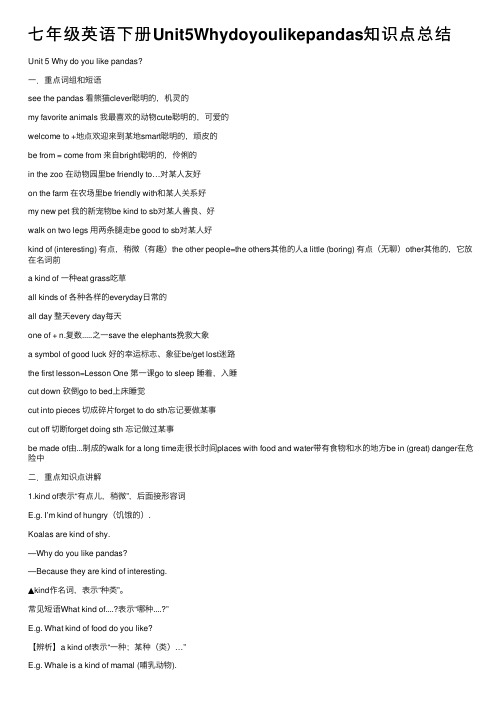
七年级英语下册Unit5Whydoyoulikepandas知识点总结Unit 5 Why do you like pandas?⼀.重点词组和短语see the pandas 看熊猫clever聪明的,机灵的my favorite animals 我最喜欢的动物cute聪明的,可爱的welcome to +地点欢迎来到某地smart聪明的,顽⽪的be from = come from 来⾃bright聪明的,伶俐的in the zoo 在动物园⾥be friendly to…对某⼈友好on the farm 在农场⾥be friendly with和某⼈关系好my new pet 我的新宠物be kind to sb对某⼈善良、好walk on two legs ⽤两条腿⾛be good to sb对某⼈好kind of (interesting) 有点,稍微(有趣)the other people=the others其他的⼈a little (boring) 有点(⽆聊)other其他的,它放在名词前a kind of ⼀种eat grass吃草all kinds of 各种各样的everyday⽇常的all day 整天every day每天one of + n.复数.....之⼀save the elephants挽救⼤象a symbol of good luck 好的幸运标志、象征be/get lost迷路the first lesson=Lesson One 第⼀课go to sleep 睡着,⼊睡cut down 砍倒go to bed上床睡觉cut into pieces 切成碎⽚forget to do sth忘记要做某事cut off 切断forget doing sth 忘记做过某事be made of由...制成的walk for a long time⾛很长时间places with food and water带有⾷物和⽔的地⽅be in (great) danger在危险中⼆.重点知识点讲解1.kind of表⽰“有点⼉,稍微”,后⾯接形容词E.g. I’m kind of hungry(饥饿的).Koalas are kind of shy.—Why do you like pandas?—Because they are kind of interesting.▲kind作名词,表⽰“种类”。
人教版七年级下册英语Unit 5 知识点语法归纳总结

人教版七年级下册英语Unit 5 知识点语法归纳总结Unit 5 Why do you like pandas?In this unit。
we will learn some XXX animals。
XXX。
Firstly。
we have the phrase "kind of"。
which means "a little" or "somewhat"。
It is used to modify adjectives and express a certain degree of something。
For example。
"I kind of like pandas" means "I like pandas a little bit".Next。
we have the ns "be from" or "come from"。
which mean "to XXX"。
For instance。
"ns are from South Africa" or "Where do ns come from?".We also have the phrase "all day" which means "the whole day"。
And when we want to indicate a n of time。
we use "for" followed by the time d。
For example。
"I played video games for 2 hours".Another useful phrase is "get lost"。
仁爱版七年级英语下册unit5知识点
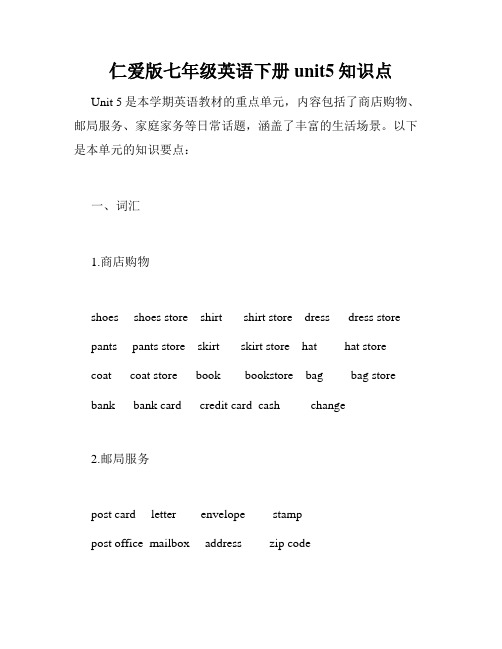
仁爱版七年级英语下册unit5知识点Unit 5是本学期英语教材的重点单元,内容包括了商店购物、邮局服务、家庭家务等日常话题,涵盖了丰富的生活场景。
以下是本单元的知识要点:一、词汇1.商店购物shoes shoes store shirt shirt store dress dress storepants pants store skirt skirt store hat hat storecoat coat store book bookstore bag bag storebank bank card credit card cash change2.邮局服务post card letter envelope stamppost office mailbox address zip code3.家庭家务clean clean up sweep mopwash laundry fold drydish do the dishes set the table clear the table二、重点语法本单元的语法重点是一般现在时和there be句型的运用。
1.一般现在时一般现在时通常用来表示反复发生的动作、习惯性的行为或者现在的状态。
它的构成方式是主语+动词原形+其他。
注意第三人称单数形式应该在动词后面加上“s”。
例如:I often go shopping on weekends. (我经常在周末去购物。
)She always buys books in the bookstore. (她总是在书店买书。
)2.there be句型there be句型用来表示某地或某处有某物。
当表示单数或者不可数名词时,应该用there is;当表示复数名词时,应该用there are。
例如:There is a bank in front of the bookstore. (书店前面有一家银行。
)There are some chairs in the classroom. (教室里有一些椅子。
Unit5++现在进行时知识点梳理-2023-2024学年仁爱版英语七年级下册
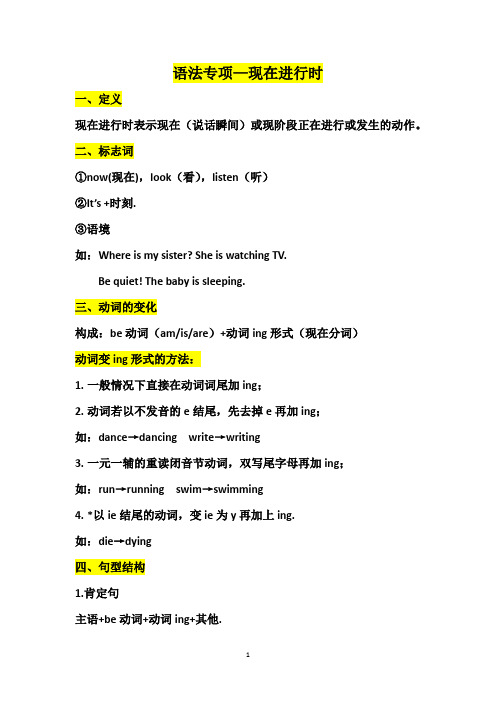
语法专项—现在进行时一、定义现在进行时表示现在(说话瞬间)或现阶段正在进行或发生的动作。
二、标志词①now(现在),look(看),listen(听)②It’s +时刻.③语境如:Where is my sister? She is watching TV.Be quiet! The baby is sleeping.三、动词的变化构成:be动词(am/is/are)+动词ing形式(现在分词)动词变ing形式的方法:1.一般情况下直接在动词词尾加ing;2.动词若以不发音的e结尾,先去掉e再加ing;如:dance→dancing write→writing3.一元一辅的重读闭音节动词,双写尾字母再加ing;如:run→running swim→swimming4.*以ie结尾的动词,变ie为y再加上ing.如:die→dying四、句型结构1.肯定句主语+be动词+动词ing+其他.2.否定句主语+be动词+not++动词ing+其他.注:is not=isn’t are not =aren’t am和not不能缩写3.Be动词+主语+动词ing+其他?肯定回答:Yes,主语+be动词.否定回答:No,主语+be动词+not.4.特殊疑问句特殊疑问词+be动词+主语+动词ing+其他?现在进行时记忆口诀:现在进行时,正在发生事它的结构很简单,be加动词ing主语变化be也变,am、is、are来体现变疑问,be提前,变否定,not紧跟be后面,切记常用标志词, now、look和listen。
练习:将下列动词变成现在分词(动词ing)形式。
study _______ do _______ come _______draw _______ see _______ play ________shop _______ fly _______ have_______。
人教版初中英语七年级下册UNIT5知识点精析

人教版初中英语七年级下册UNIT5知识点精析七年级下册UNIT5Why do you like pandas?你为什么喜欢熊猫?重点●提建议的句型●forget的用法难点●why 引导的特殊疑问句●形容词的用法语法●why引导的特殊疑问句;形容词的用法公众号Section A重点单词panda熊猫zoo 动物园tiger 老虎elephant大象lion狮子giraffe 长颈鹿animal动物cute 可爱的;机灵的lazy懒散的;懒惰的smart 聪明的beautiful美丽的;美好的kind种类Australia 澳大利亚south南方的;南,南方Africa 非洲pet 宠物cat猫leg 腿sleep 睡觉重点短语kind of 稍微;有点儿South Africa 南非black and white 黑白相间重点句型1.Let's see the pandas first.咱们先看熊猫吧。
2.They're my favorite animals.它们是我最喜欢的动物。
3.Where are they from?它们来自哪里?4.She sleeps all day...她整天睡觉......Section B重点单词friendly友好的shy 羞怯的;腼腆的save救;救助flag旗;旗帜place地点;位置forget忘记;遗忘water 水danger危险cut砍;切down(坐、躺、倒)下;向下;沿着tree树kill杀死;弄死over超过,多于;在……上方重点短语get lost 迷路be in(great) danger 处于(极大)危险之中lose one's home失去某人的家园cut down 砍倒(be)made of 由……制成的重点句型1.The elephant is one of Thailand's symbols.大象是泰国的象征之一。
仁爱英语七年级下册Unit5语法、知识点及练习 (共51张PPT)
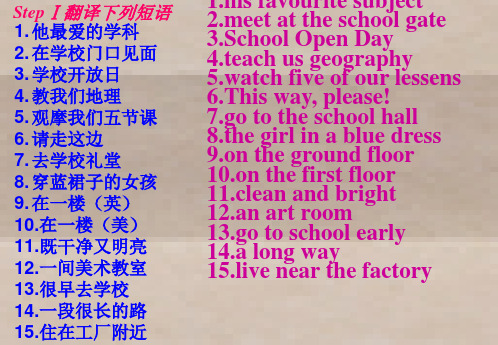
27.一种花
27.a kind of flower
28.对我们友善
28.be kind/friendly to us
29.谢谢你的来信/帮助29.Thank you for your letter/help
30.谢谢你帮助我做作 30. Thank you for helping me with my
_______m(haakpepsily)?
feel
8. Iht aupsupaylly ______(take) _____(I) an hour _______(finish)
_____(I) homtaekweosrk.
me
to finish
9. It’ms ytime for _____(they) _______ (have) dinner.
5. Thebreegisingoing to _____(be) a _______(parent)________
(meet).
be
parents’
meeting
6. How about _________(play) our games?
7. What ______(pmlaaykien)gyou _______(feel) so
English. 4. I hope her dream comes true. 5. We often talk about the ball games on TV.
1. welcome to our school 2. be good at Maths == do well in Maths 3. tell her mother about Sunshine Middle
1. Our teaching building is so big 2. Our library looks very modern 3. Who is the girl in a red skirt? ---- She is my cousin 4. Let me show you around 5. We have meetings in the school hall 6. There is a library and two art rooms in our
仁爱版英语七年级下册 第五单元 知识点汇总
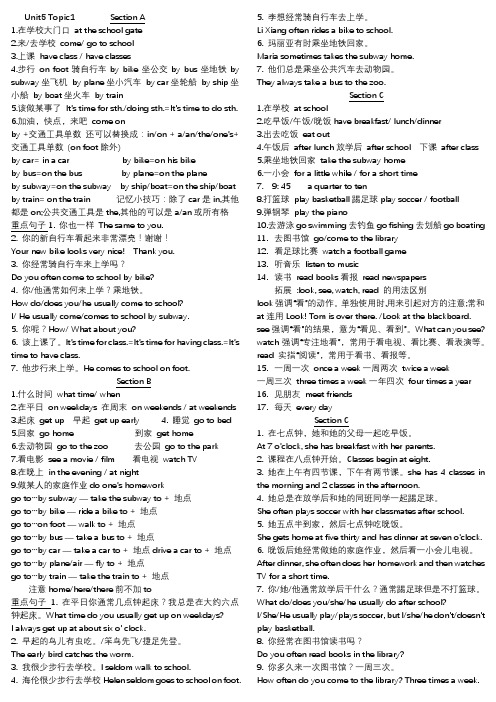
Unit5 Topic1Section A1.在学校大门口at the school gate2.来/去学校come/ go to school3.上课have class / have classes4.步行on foot骑自行车by bike坐公交by bus坐地铁by subway坐飞机by plane坐小汽车by car坐轮船by ship坐小船by boat坐火车by train5.该做某事了It’s time for sth./doing sth.=It’s time to do sth.6.加油,快点,来吧come onby +交通工具单数还可以替换成:in/on + a/an/the/one’s+交通工具单数(on foot除外)by car= in a car by bike=on his bikeby bus=on the bus by plane=on the planeby subway=on the subway by ship/boat=on the ship/boat by train= on the train 记忆小技巧:除了car是in,其他都是on;公共交通工具是the,其他的可以是a/an或所有格重点句子1. 你也一样The same to you.2. 你的新自行车看起来非常漂亮!谢谢!Your new bike looks very nice! Thank you.3. 你经常骑自行车来上学吗?Do you often come to school by bike?4. 你/他通常如何来上学?乘地铁。
How do/does you/he usually come to school?I/ He usually come/comes to school by subway.5. 你呢?How/ What about you?6. 该上课了。
It’s time for class.=It’s time for having class.=It’s time to have class.7. 他步行来上学。
七下英语第五单元笔记

七下英语第五单元笔记
以下是七下英语第五单元的笔记,供您参考:
1. 重点单词:
weekend(n.)周末
usually(ad.)通常
sometimes(ad.)有时
seldom(ad.)很少
never(ad.)从不
on weekends(介词短语)在周末
go to the movies(短语)去看电影
stay at home(短语)呆在家里
2. 重点短语:
do homework(短语)做作业
watch TV(短语)看电视
go to the park(短语)去公园
visit grandparents(短语)拜访祖父母
3. 重点句型:
What do you usually do on weekends?(疑问句)你通常在周末做什么?
I usually do my homework.(陈述句)我通常做作业。
How often do you go to the movies?(疑问句)你多久去看一次电影?
I go to the movies twice a month.(陈述句)我每个月看两次电影。
4. 重点语法:
频率副词的使用,如always、usually、sometimes、seldom、never等。
疑问句和陈述句的转换,如将疑问句转换为陈述句或将陈述句转换为疑问句。
5. 重点发音:
/æ/音标的发音,如单词“cat”、“bag”、“man”等。
初中英语人教新目标七年级下册Unit 5Grammar写作指导(知识点+练习题)
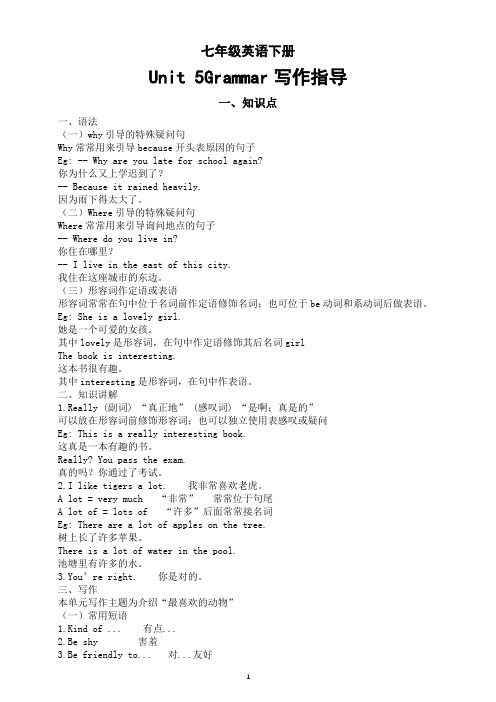
七年级英语下册Unit 5Grammar写作指导一、知识点一、语法(一)why引导的特殊疑问句Why常常用来引导because开头表原因的句子Eg: -- Why are you late for school again?你为什么又上学迟到了?-- Because it rained heavily.因为雨下得太大了。
(二)Where引导的特殊疑问句Where常常用来引导询问地点的句子-- Where do you live in?你住在哪里?-- I live in the east of this city.我住在这座城市的东边。
(三)形容词作定语或表语形容词常常在句中位于名词前作定语修饰名词;也可位于be动词和系动词后做表语。
Eg: She is a lovely girl.她是一个可爱的女孩。
其中lovely是形容词,在句中作定语修饰其后名词girlThe book is interesting.这本书很有趣。
其中interesting是形容词,在句中作表语。
二、知识讲解1.Really (副词) “真正地” (感叹词) “是啊;真是的”可以放在形容词前修饰形容词;也可以独立使用表感叹或疑问Eg: This is a really interesting book.这真是一本有趣的书。
Really? You pass the exam.真的吗?你通过了考试。
2.I like tigers a lot. 我非常喜欢老虎。
A lot = very much “非常”常常位于句尾A lot of = lots of “许多”后面常常接名词Eg: There are a lot of apples on the tree.树上长了许多苹果。
There is a lot of water in the pool.池塘里有许多的水。
3.You’re right. 你是对的。
三、写作本单元写作主题为介绍“最喜欢的动物”(一)常用短语1.Kind of ... 有点...2.Be shy 害羞3.Be friendly to... 对...友好4.A symbol of... ...的象征5.Be from ... 来自...(二)常用句型1.This is ... 这是...2....is ...years old ...多少岁3.I like ...because ... 我喜欢...因为...4....live in ... ...住在...5....is/are from ... ...来自...(三)写作思路第一步:介绍姓名第二步:介绍外貌特征第三步:介绍来自某地第四步:介绍年龄第五步:介绍喜欢的原因(四)范文介绍一种自己喜欢的动物There are many kinds of animals in the world.But my favourite animal is Huahua.She is a panda.I think everyone likes her.She is black and white.She has two big black ears and eyes.She also has black legs and arms.And she is very cute.She is three years old.She is from China.Now she lives in Sichuan.She is popular.Lots of people come to the zoo to see her.Do you want to see her one day?二、练习题一、用所给词的适当形式填空1.There _______ (be) lots of animals in the zoo.2.Mr.Lin ________ (teach) us English.3.She is _________ (real) nice.4.The music ________ (sound) beautiful.5.Why don’t you _______ (like) this book?二、单项选择( )1.--______ do you like this movie?-- Because it is interesting.A.WhatB.HowC.WhereD.Why( )2.-- ______ do they study on Sundays?-- In the library.A.WhatB.WhereC.WhyD.Who( )3.-- What _____ does she like?-- She likes dogs very much.A.subjectsB.colorsC.sportsD.animals( )4.--Where ______ this man ______?-- He’s from Australia.A.is; come fromB.does; fromC.is; fromD.is; comes from( )5.-- Lucy is so cute.-- _______.Everyone likes her very much.A.I’m not sureB.Thank youC.Yes, you’re rightD.I don’t know( )6.This dog is so lovely, it can walk _____ two legs.A.withB.forC.toD.on三、句型转换1.Betty is from America.(就划线部分提问)______ ______ Betty ______?2.I like apples because they are very sweet.(就划线部分提问)______ ______ _____ like apples?3.because, don’t, lazy, I, are, like, they, koalas (连词成句)_________________________4.Where is your English teacher from ? (同义句转换)______ _____ your English teacher ______ ______?5.The panda is black and white.(就划线部分提问)______ ______ ______ the panda?四、任务型阅读My name’s Jodie King.I’m 12 years old.I’m from the UK.Now I live in China.I’m a student of Yuying Middle School.I go to school from Monday to Friday.On Saturday and Sunday, we have no classes.On Saturday, 1.我通常做我的家庭作业.On Sunday I often go to the zoo with my parents.I like elephants very much because they’re smart.2.但我爸爸喜欢熊猫。
人教七年级下册英语U5知识点
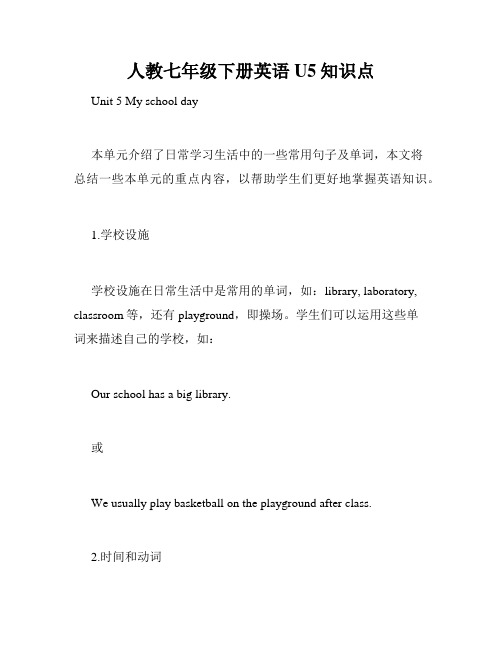
人教七年级下册英语U5知识点Unit 5 My school day本单元介绍了日常学习生活中的一些常用句子及单词,本文将总结一些本单元的重点内容,以帮助学生们更好地掌握英语知识。
1.学校设施学校设施在日常生活中是常用的单词,如:library, laboratory, classroom等,还有playground,即操场。
学生们可以运用这些单词来描述自己的学校,如:Our school has a big library.或We usually play basketball on the playground after class.2.时间和动词时间和动词是英语语言中的重要部分。
在本单元中,有一些常用动词,如:get up, have breakfast/lunch/dinner, go to bed等。
学生们可以运用这些单词来描述自己的日常生活,如下:I usually get up at 6:30 in the morning.I have breakfast at 7 o'clock.I go to bed at 10 o'clock at night.3.日常活动在学习英语的过程中,日常活动也是常用语句。
在本单元中,有一些常用语句,如:It's time to..., I take..., I play..., I do..., 等。
学生们可以运用这些常用语句来叙述自己的日常生活,如下:It's time to go to school now.I take a bus to school every morning.I usually play basketball with my friends after school.I do my homework before dinner.4.一般现在时的动词变化一般现在时在英语语言中也是十分常见的。
人教版七年级下册英语Unit 5 --6知识点语法归纳总结
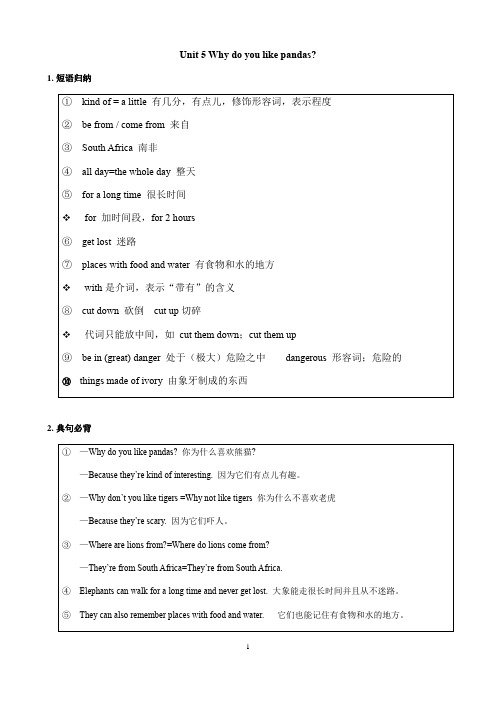
Unit 5 Why do you like pandas?1.短语归纳2.典句必背3.用法集萃(1)Well, because she’s kind of boring. 嗯,因为她有点儿无聊❖kind of意为“稍微;有点儿”,用来修饰形容词或副词,表示程度,和a bit, a little, a little bit意义相同。
例:The monkey is kind of cute. 那只猴子有点儿可爱❖含有kind的短语还有:牛刀小试There are many ______ animals in the zoo. Most of them are _______ cute.A.kind of; kind ofB.kinds of; kind ofC.kinds of; kinds ofD.kind of; kinds of(2)She sleeps all day, and her name is Lazy. 她整天睡觉,她的名字叫Lazy❖sleep可以作动词,也可以作名词,意为“睡觉”。
例:It’s time to sleep. 该睡觉了I sometimes have a sleep in the afternoon. 我有时下午睡觉❖派生词:sleepy adj.困乏的;想睡的asleep adj. 睡着的(fall asleep 入睡;睡着)牛刀小试Paul stayed up late to watch the soccer game last night and now he feels very_______ .A.sleep B . asleep C.sleepy(3)I don’t like cats because they’re lazy. 我不喜欢猫,因为它们很懒❖lazy作形容词,意为“懒散的;懒惰的”。
例:The boy is lazy and he never gets up early on weekends.❖反义词:hard-working adj. 勤奋的;勤勉的(4)People say that “an elephant never forgets”. 人们常说“大象从不忘记”❖辨析:forget to do sth.;forget doing sth.牛刀小试Don’t forget _____ your hands before you have dinner.A.to washB. washingC. washD. washes(5)Elephants can walk for a long time and never get lost. 大象能够长时间行走,而且从不迷路❖lost 作为形容词,意为“走失的,迷路的,失散的”或者“丢失的,遗失的”;常与系动词be或者get连用,表示“丢失,走失,迷路”。
仁爱版七年级下册Unit5_Topic1_知识点归纳

仁爱版七年级下册U n i t5_T o p i c1_知识点归纳work Information Technology Company.2020YEARUnit 5 Our School LifeTopic 1 How do you usually come to school?一、重点短语:Come on on foot take a bus by bus after school a short time listen toWatch TV know about be over in one’s free time on weekdays go to bed二、重点句型:1. I never come to school by subway.2. Maria sometimes takes the subway home.3. We usually go to the park on foot.4. I seldom walk to school.5. Li Xiang often rides a bike to school.6. They always go to the zoo by bus.7. --Happy New Year! --Happy New Year!/ The same to you.8. The early bird catches the worm.9. She goes to bed at about a quarter to ten.10. --How often do you come to the library--Three times a week./ Very often./三、重点知识点1. The same to you也祝你……。
用于别人向你祝福时对对方的回应,相当于You, too!e.g.-- Have a nice weekend!周末愉快! -- The same to you!也祝你愉快!2. look在此为系动词,表示“看起来……,看上去……”,后面接形容词。
七年级英语(下册) Unit 5重点词汇和重点短语

七年级英语(下册)Unit5重点词汇和重点短语一、词汇攻关1.building(n.)→build(v.&n.)建筑;体格→built(过去式/过去分词)建造,建设→builder(n.)建立者;建筑者★build sb.sth./build sth.for sb.为某人建造某物★build up建立;增进;增强★of strong build体格健壮的2.train(n.&v.)→trained(adj.)受过训练的;熟练的→trainee(n.)受训练者;实习生→trainer(n.)运动鞋;教练员;驯兽师→training(n.)训练;锻炼;培养;驯化★train sth./sb.to do sth.训练……做……★train for为……接受训练★train as作为……接受训练3.catch(v.)→caught(过去式/过去分词)赶上★catch a cold感冒★catch up with追上,赶上★catch fire着火★catch the train/plane赶上火车/飞机★be caught in the rain淋雨4.ride(v.&n.)→rode(过去式)→ridden(过去分词)骑★give sb.a ride捎某人一程5.watch(v.)→watches(第三人称单数)→watched(过去式/过去分词)观看;当心→watch(n.)表,手表★watch out当心★keep watch(for sth.)看守,警惕★on watch值班★watch TV看电视6.begin(v.)→began(过去式)→begun(过去分词)→beginning(现在分词&n.)开始;开端→beginner(n.)初学者;生手;创始者★begin doing/to do sth.开始做某事★begin with以……作为开始★in the beginning最初,起初★from beginning to end从头到尾7.swim(v.)→swam(过去式)→swum(过去分词)→swimming(现在分词)游泳→swimmer(n.)游泳者★go swimming去游泳★go for a swim去游泳8.listen(v.)→listening(现在分词)听→listener(n.)听者;听众★listen to听;倾听★listen for留神听9.music(n.)→musical(adj.)音乐的→musician(n.)乐手,音乐家,乐师10.talk(n.&v.)→talker(n.)说话者→talkative(adj.)爱说话的,健谈的★talk to/with sb.与某人交谈,谈话★talk about/on…谈论……★talk back(to sb.)顶嘴,回嘴★talk to oneself自言自语★give a talk演讲,讲话11.make(v.)→made(过去式/过去分词)做,制造;使成为→maker(n.)生产者,制造者→making(n.)制作;制造★make sb.sth./make sth.for sb.为某人制作某物★make up编造;和解;化妆;弥补★make it设法安排;成功12.boring(adj.)→bore(v.)使厌烦→bored(adj.)无聊的,无趣的★be bored with sth.对……感到厌烦13.clean(v.&adj.)→cleaning(现在分词)→cleaned(过去式/过去分词)打扫→cleaner(n.)清洁工;吸尘器★do some cleaning打扫卫生★clean up清除;打扫干净14.run(v.)→ran(过去式)→run(过去分词)→running(现在分词)跑→runner(n.)跑步者★run after追赶;追求★run about到处跑15.use(v.&n.)→used(过去式/过去分词)用,使用→user(n.)使用者→useful(adj.)有用的→useless(adj.)无用的★used to do sth.过去常常做某事★be used to doing sth.习惯于做某事★be used to do sth.被用来做某事★come into use开始使用★be in use使用中★use your head动动脑子★make use of利用;使用16.shelf(n.)→shelves(pl.)搁板,搁架→bookshelf(n.)书架17.keep(v.)→kept(过去式/过去分词)保存;保持→keeper(n.)看守人;守卫;守门员★keep away from远离;避开★keep doing sth.持续做某事★keep sb.from doing sth.阻止某人做某事★keep up with跟上18.sit(v.)→sat(过去式/过去分词)→sitting(现在分词)坐★sit down就座,坐下★sit up坐起来;使坐起来19.write(v.)→wrote(过去式)→written(过去分词)写→writer(n.)作家,作者★reading and writing阅读与写作★write(a letter)to sb.给某人写信★write back to sb.给某人回信★write down写下,记下20.wonderful(adj.)→wonder(v.)想知道;感到惊讶→wonder(n.)惊讶;奇迹→wonderfully(adv.)不可思议地;绝妙地★no wonder不足为奇21.history(n.)→historical(adj.)历史的;历史学的;与历史有关的→historic(adj.)有历史意义的;历史上著名的;历史性的22.few(adj.&pron.)→fewer(比较级)较少的→fewest(最高级)最少的★a few几个,一些23.science(n.)→scientist(n.)科学家→scientific(adj.)科学的,有关科学的★science fiction科幻小说24.easy(adj.)→easily(adv.)容易地→easier(比较级)较容易的→easiest(最高级)最容易的→hard/difficult(反义词)困难的★take it easy别紧张25.interesting(adj.)→interested(adj.)感兴趣的→interest(n.&v.)兴趣,爱好;利益,利息;权益;使感兴趣★be/get/feel interested in对……感兴趣★show/have(an)interest in…对……有兴趣★lose interest in…对……失去兴趣★with interest饶有兴趣地26.difficult(adj.)→difficulty(n.)困难★have difficulty(in)doing sth.做某事有困难★without difficulty毫不费力地;轻而易举地27.learn(v.)→learnt/learned(过去式/过去分词)学习,学会;获悉→learner(n.)学习者,初学者★learn to do sth.学会做某事★learn from…从/向……学习★learn sth.by oneself自学★learn…by heart用心学……;背下来28.activity(n.)→activities(pl.)活动★outdoor activities户外运动29.study(v.&n.)→studies(第三人称单数)→studied(过去式/过去分词)学习;研究→study(n.)书房30.early(adj.)→early(adv.)早;提早→earlier(比较级)较早的→earliest(最高级)最早的→late(反义词)迟到的;晚的★catch the early bus赶上早班车★early in the morning清早31.late(adj.)→late(adv.)迟到→lately(adv.)近来★be late for doing sth.做某事迟到了★in the late afternoon傍晚★later in the afternoon下午的晚些时候二、重点短语1.come on快点儿;加油;来吧2.go to school on foot/walk to school步行去上学3.at school在学校,在上课4.the Great Wall长城5.make room for为……腾出个地儿6.dining hall餐厅7.at the school gate在学校门口8.by bus/car/subway乘公共汽车/小汽车/地铁9.on weekdays在工作日10.take the bus/train/plane/car乘坐公交车/火车/飞机/小汽车11.listen to music听音乐12.do one's homework做家庭作业13.go to bed上床睡觉14.the same to you你也一样15.three times a week一周三次16.do some cleaning打扫卫生17.ride a bike骑自行车18.once/twice a week每周一次/两次19.know about了解,知道20.on Thursday morning在周四上午21.be over结束22.in one's free time在某人的业余时间23.play cards打扑克牌24.classroom building教学楼25.on time按时;准时26.borrow…from…从……借来……27.show sb.around带某人参观28.have a soccer game有一场足球赛29.in the swimming pool在游泳池30.write(a letter)to sb.给某人写信31.at the back of…在……的后面32.have an English class上英语课33.learn about the past了解过去34.a map of China一幅中国地图35.work on math problems算数学题36.be kind to sb.对某人友好37.some other subjects一些别的科目38.different kinds of…不同种类的……39.watch a movie/see a film看电影40.study English grammar学习英语语法41.care about关心;在乎42.play computer games玩电脑游戏三、重点句型1.It's time for e on!上课时间到了,快点!2.I seldom walk to school.我很少步行上学。
人教七年级下unit5知识点

人教七年级下unit5知识点在人教七年级下unit5课程中,我们学习了关于“食物和饮料”这一主题的知识点。
以下是本单元主要的知识点:一、单词和短语1. 食物:fruit, vegetables, chicken, fish, bread, rice, noodles, milk, cheese, cake 等。
2. 饮料:water, juice, tea, coffee, cola, lemonade 等。
3. 特殊饮食需求:vegetarian(素食主义者), vegan(纯素食主义者)等。
4. 食物和饮料的数量:a glass of milk, a cup of tea, a bottle of water, a loaf of bread 等。
二、语法1. 倒装句:在英语中,为了强调某些语句内容,常使用倒装句。
例如:Never have I seen such a beautiful sunset.(我从未看过如此美丽的日落。
)2. 疑问句类型:在英语中,疑问句有两种类型,一种是一般疑问句,以助动词开头,另一种是特殊疑问句,以特殊疑问词开头。
例如:Do you like apples?(你喜欢苹果吗?)What kind of food do you like?(你喜欢什么食物?)三、口语表达1. 询问对方喜欢什么食物、饮料等:What kind of food/drink do you like?2. 询问对方是否饱了:Are you full?3. 表达自己的饮食要求:I am a vegetarian.4. 发表自己对食品的看法:I love pizza. It's delicious.以上就是本单元的主要知识点,希望同学们能够通过学习,掌握这些基础的英语单词和语法知识,为今后更高层次的英语学习打下坚实的基础。
七年级英语下册Unit 5 单元重点语法
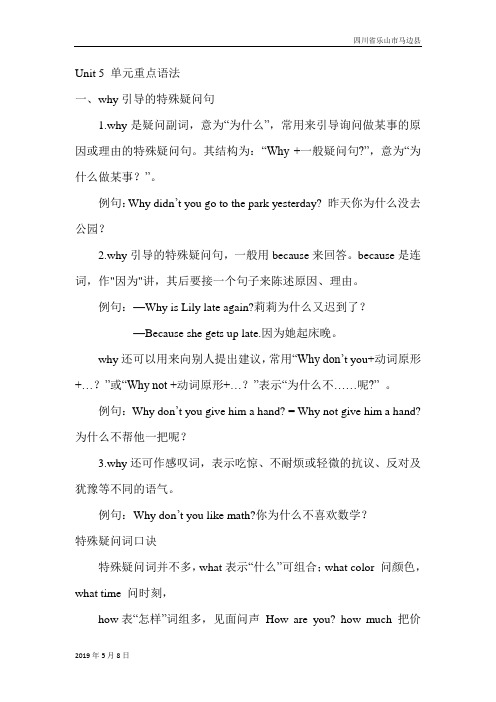
Unit 5 单元重点语法一、why引导的特殊疑问句1.why是疑问副词,意为“为什么”,常用来引导询问做某事的原因或理由的特殊疑问句。
其结构为:“Why +一般疑问句?”,意为“为什么做某事?”。
例句:Why didn’t you go to the park yesterday? 昨天你为什么没去公园?2.why引导的特殊疑问句,一般用because来回答。
because是连词,作"因为"讲,其后要接一个句子来陈述原因、理由。
例句:—Why is Lily late again?莉莉为什么又迟到了?—Because she gets up late.因为她起床晚。
why还可以用来向别人提出建议,常用“Why don’t you+动词原形+…?”或“Why not +动词原形+…?”表示“为什么不……呢?” 。
例句:Why don’t you give him a hand? = Why not give him a hand? 为什么不帮他一把呢?3.why还可作感叹词,表示吃惊、不耐烦或轻微的抗议、反对及犹豫等不同的语气。
例句:Why don’t you like math?你为什么不喜欢数学?特殊疑问词口诀特殊疑问词并不多,what表示“什么”可组合;what color 问颜色,what time 问时刻,how表“怎样”词组多,见面问声How are you? how much 把价问,how many 问数量,when 问时间较模糊,要与what time区分开;where“在哪里”,寻找物品莫忘它,询问原因why常在,回答要用because。
多问问题少出错,句末别忘添问号。
二、形容词的基本用法形容词通常用来描述和修饰名词或代词,说明人或事物的性质、状态和特征。
大多数形容词既可作定语又可作表语。
下面我们来学习一些形容词的基本用法。
1.作定语。
用于修饰名词,表示名词的属性,常置于它所修饰的名词前。
- 1、下载文档前请自行甄别文档内容的完整性,平台不提供额外的编辑、内容补充、找答案等附加服务。
- 2、"仅部分预览"的文档,不可在线预览部分如存在完整性等问题,可反馈申请退款(可完整预览的文档不适用该条件!)。
- 3、如文档侵犯您的权益,请联系客服反馈,我们会尽快为您处理(人工客服工作时间:9:00-18:30)。
七年级下册unit5语法知识点
在七年级下册的Unit5中,我们学习了不少英语语法知识点,
这些知识点对于我们掌握英语语言体系,提高我们的英语水平具
有极大的帮助。
下面就让我们一起来回顾一下本单元的语法知识
点吧。
一、过去进行时
过去进行时是表示过去某个时刻正在进行的动作或状态的时态,其构成形式为was/were + 动词ing。
例如:
1、I was watching TV when my friend called me.(我朋友给我打
电话时我正在看电视。
)
2、They were playing soccer on the playground when the rain started.(下雨时他们正在操场上踢足球。
)
二、一般将来时
一般将来时是表示将来发生的动作或状态的时态,其构成形式为will/shall + 动词原形。
例如:
1、I will go to school by bike tomorrow.(明天我要骑车去学校。
)
2、He shall help his mother do the housework this weekend.(他计划这个周末帮他妈妈打扫卫生。
)
三、情态动词
情态动词是表示说话人的语气、情感态度的动词,包括can, could, may, might, must, shall, should, will, would等。
情态动词和动词原形构成的动词短语可以表达不同的意义。
例如:
1、Can I have a glass of water?(我能喝一杯水吗?)
2、You must turn off the lights when you leave the classroom.(你
走出教室时必须关灯。
)
四、复合句
复合句是由两个或多个句子连接而成的句子,在结构上有主句
和从句之分。
从句一般修饰主句,说明主句中的事物或情况。
例如:
1、She said that she would come to see me.(她说她会来看我。
)
2、I don’t know whether he likes pizza or not.(我不知道他是否
喜欢比萨。
)
以上就是本单元中涉及到的主要语法知识点。
希望同学们在学
习英语的道路上能够勇往直前,不断地进步与提高!。
